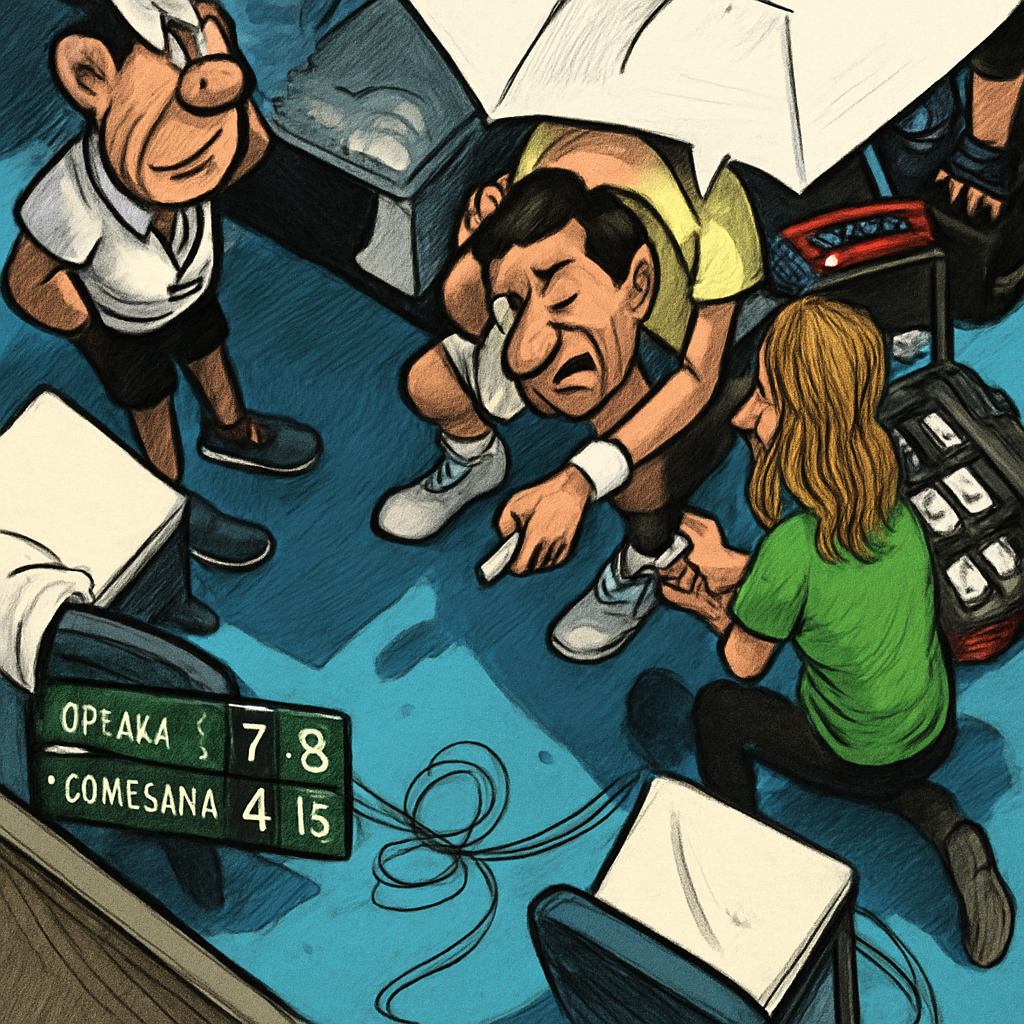CINCINNATI — Argentine tennis player Francisco Comesana made headlines at the Western & Southern Open on Wednesday after collapsing mid-match due to a sudden illness, forcing a medical timeout during his second-round clash against Alexander Zverev. The worrying scenes unfolded as the 23-year-old qualifier, who had been competing fiercely, abruptly halted play on his serve in the second set.
The incident occurred with Comesana leading 4-3 in the second set after dropping the opener 6-7(5). As he prepared to serve at 30-15, the world No. 122 visibly struggled, bending over and clutching his stomach before signaling to the chair umpire. Tournament medical staff rushed to the court as a concerned Zverev crossed the net to check on his opponent. "I could see he wasn’t okay—he looked pale and was breathing heavily," Zverev later told reporters.
Medical Emergency Halts Play
Play was suspended for nearly 10 minutes as Comesana received treatment courtside. Broadcast footage showed the Argentine draped in ice towels while medics checked his blood pressure and hydration levels. ATP Tour physiotherapists later confirmed he was suffering from "severe dehydration and heat exhaustion exacerbated by the humid conditions." The on-site heat index had reached 95°F (35°C) with 70% humidity at the time of the incident.
Despite attempts to continue, Comesana retired from the match after managing just two more points post-timeout. The Argentine, who had stunned 15th seed Ben Shelton in the first round, received a standing ovation as he left the court in a wheelchair. Tournament director Todd Martin addressed the situation in a press briefing: "Player safety is our top priority. We’re monitoring Francisco closely and will provide updates on his condition."
A Promising Run Cut Short
The retirement marked a heartbreaking end to Comesana’s breakthrough Cincinnati campaign. Earlier in the week, he had earned his first ATP Masters 1000 main-draw victory against Shelton, showcasing his trademark:
- Powerful baseline game
- Exceptional court coverage
- Fearless net approaches
His coach, former ATP pro Mariano Zabaleta, expressed frustration about the conditions: "Francisco prepared perfectly for this event. The humidity here is extreme—we’ve played in hot tournaments before, but the combination with the high humidity makes it dangerous. The ATP needs to reconsider scheduling matches during peak heat hours." This sentiment was echoed by several players, including Zverev, who noted the court surface temperature exceeded 120°F (49°C) during afternoon matches.
Tournament Response
The Western & Southern Open implemented its extreme heat policy following the incident, allowing for additional breaks between games when the Wet Bulb Globe Temperature (WBGT) exceeds 82.4°F (28°C). However, critics argue the measures don’t go far enough. The ATP’s current heat rulebook states players may request a 10-minute break "if the WBGT exceeds 30.1°C for two consecutive hours," but doesn’t mandate automatic suspensions.
Medical experts weighed in on the risks. Dr. Rebecca Myers, a sports physician at Cincinnati Children’s Hospital, explained: "Heat illness can escalate rapidly from cramps to heat stroke—a life-threatening condition. Tennis is particularly vulnerable because players can’t self-pace like in other sports. The combination of prolonged exertion, direct sun exposure, and reflective court surfaces creates a perfect storm."
Player Reactions
The tennis community rallied around Comesana on social media. Shelton tweeted: "Tough to see a competitor like Fran go down like that. Hope he recovers quickly—the tour needs warriors like him." Zverev, who advanced to the third round, dedicated his next match to Comesana during his on-court interview.
This incident follows other high-profile heat-related withdrawals in recent years, including Daniil Medvedev’s 2020 US Open semifinal collapse and Emma Raducanu’s 2021 Wimbledon retirement. The ATP and WTA face increasing pressure to revise heat policies, particularly for North American summer tournaments where conditions are most severe.
Looking Ahead
Comesana’s team confirmed he was stable at a local hospital receiving IV fluids. His participation in next week’s Winston-Salem Open remains uncertain. As the tennis world awaits updates, this incident reignites debates about player welfare in extreme conditions. With climate change increasing the frequency of heat waves, governing bodies may need to implement stricter protocols to prevent future emergencies. "No match is worth risking a player’s health," Zverev remarked. "Sometimes the sport needs to put people before profits."

